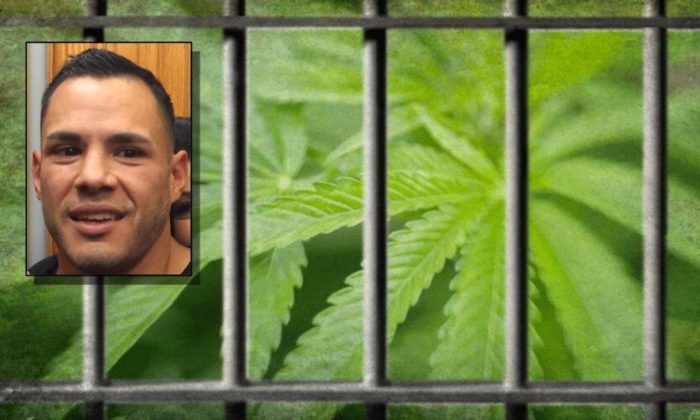
Despite experiencing body pains, a headache, coughing, and sweating, Maglio reported to his family that his request to see a doctor was refused.
David Maglio’s cannabis habit has already cost him plenty.
In March 2016, his home in Hull was raided by a SWAT team based on his high electric bills and a statement by a cop that he smelled marijuana coming from the house. It didn’t matter that Maglio was a medical marijuana patient with a hardship cultivation license.
After three years of pretrial detention, he was convicted of federal dealing charges based solely on the amount of cannabis found in his house. Maglio maintains that he was not selling to anyone, and no direct evidence of sales was produced; still, he lost his case. And now he has the honor of being the first person in his privately run federal detention facility in Rhode Island to test positive for COVID-19.
Following his trial last October, Maglio was convicted of possession with intent to sell and illegal possession of guns, but acquitted of a charge of possessing guns in furtherance of a crime. Sentencing was originally set for January 24, but was postponed because the prosecution, given three months, had not managed to get its recommendations ready. When sentencing finally took place on March 12, the prosecution asked for Maglio’s sentence to be increased on the basis of the charge of possessing guns in furtherance of a crime, saying that the “preponderance of the evidence” supported such a charge, since the guns had been loaded and stored close to a stash of packaged weed.
At Maglio’s trial, the jury had considered the same “preponderance of the evidence,” and did not support the charge. Nevertheless, the judge, Mark Wolf, agreed with prosecutors that the “preponderance of the evidence” supported the charge, regardless of the jury’s verdict. Wolf did not ultimately take advantage of the opportunity to add to Maglio’s sentence, but still sentenced Maglio to eight years in prison (three being already served), plus forfeiture of the guns and $5,000 in cash that had been found in his house. In a closing statement, Wolf said that such a sentence was appropriate, both to impress upon Maglio the seriousness of his crimes, and to protect the community from the danger of purveying such a dangerous drug.
According to reporting by the Providence Journal, Maglio was transferred on April 2 from a facility in Massachusetts to the Donald W. Wyatt Detention Facility, a privately operated lockup located in Central Falls, Rhode Island, and placed in the “new man” unit for two weeks of screening for the coronavirus. Maglio says he started feeling sick soon after arriving, but on April 17 he was transferred into the general population, after which he reported feeling extremely ill.
Despite experiencing body pains, a headache, coughing, and sweating, Maglio reported to his family that his request to see a doctor was refused. When his temperature was finally taken two days later, it was 102 degrees. On April 21, Maglio became the first person among the nearly 600 detained at Wyatt to test positive for COVID-19. In the time since, he reports being held under 23-hour-a-day lockdown, first in a cell in back of the infirmary and later in another block with six other inmates who have tested positive.
In the Journal article, former federal judge and Harvard Law School faculty member Nancy Gertner was highly critical of Wyatt’s response to the threat of coronavirus: “It’s clear they didn’t do the things they needed to do before an outbreak.” A spokesman for the prison initially declined to comment about Maglio’s account, but after the Journal published its story last week released a statement, attributed to Warden Daniel Martin, noting: “the Facility categorically denies his allegations regarding the care and medical treatment he received at our Facility. However, due to privacy laws, we cannot comment any further on Mr. Maglio’s claims as we do not have Mr. Maglio’s written authorization to discuss his medical issues in the press.”
Reached by phone on April 29, Maglio said he is beginning to feel better, though he is still under a 23-hour lockdown. His lawyers, Carmine Lepore and Ashley Allen, are appealing his sentence on the basis that the search warrant for the original raid was invalid. Gertner will also be consulting on the appeal.
Meanwhile, Maglio is scheduled to be transferred to another holding facility in either Brooklyn or New Jersey, and from there to a federal prison somewhere on the West Coast. Lepore estimates that with good behavior Maglio might be released in about two years, which means that his son, who was born shortly after his arrest, may feel his father’s embrace for the first time at the age of six.
This article was produced in collaboration with the Boston Institute for Nonprofit Journalism as part of its Pandemic Democracy Project.
HELP DIGBOSTON WEATHER THIS STORM AND CONTINUE PROVIDING ARTICLES LIKE THIS ONE
Andy Gaus is a longtime cannabis advocate and a member of MassCann.

